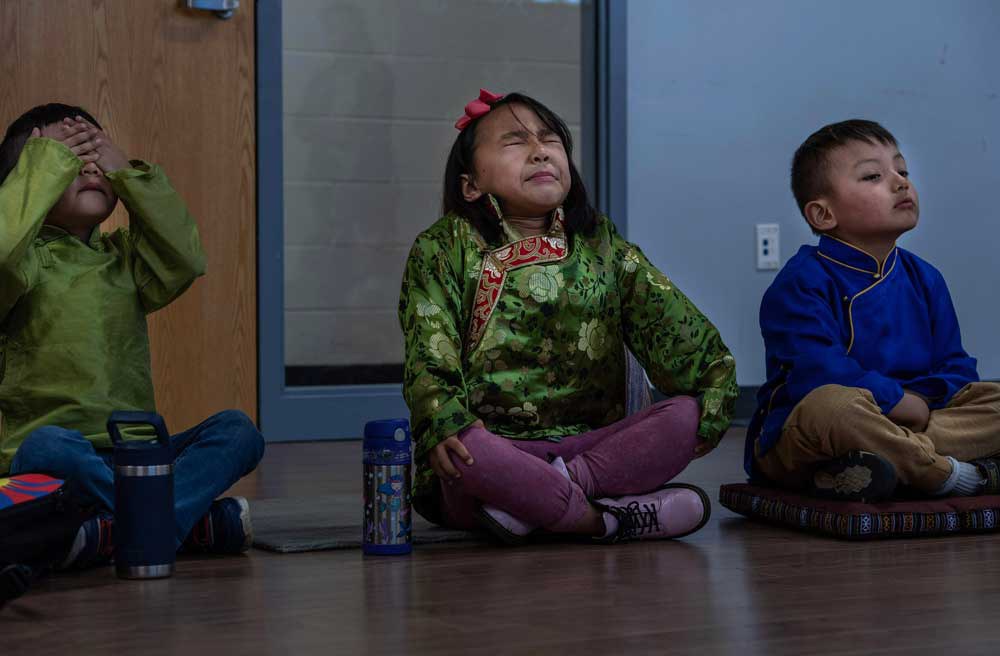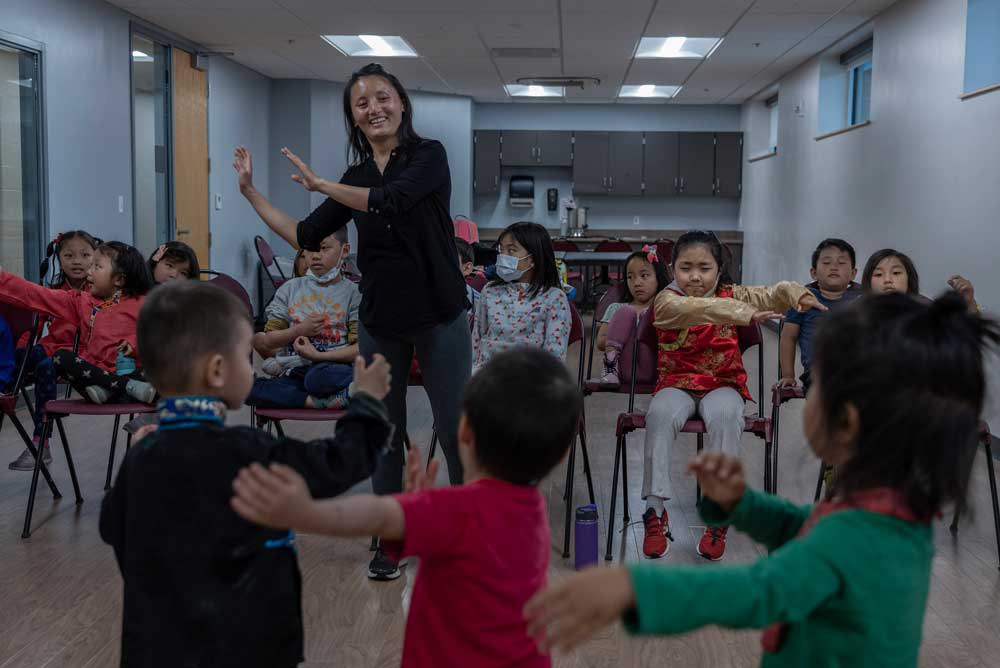Striving to preserve Tibetan language and culture among the diaspora
Share
Stepping up to take the microphone, 9-year-old Tenzing Kunzang Gyanakwa got up in front of a group of about 60 students, teachers and parents gathered in the community center.
In a clear voice, he told the crowd about the “simple yet powerful” message of a children’s book by the Dalai Lama, the Tibetan Buddhists’ spiritual leader.
“The Dalai Lama believes that cultivating compassion can make us happier and more fulfilled individuals, and that it can also have a positive impact on others,” said Tenzing, sporting a blue Tibetan shirt with gold piping and fringe, about “The Seed of Compassion.”
Tenzing’s Sunday afternoon presentation was part of the opening assembly of a weekly Tibetan language school at a community center in Vienna, northern Virginia, outside Washington DC, where children between the ages of three and 18 are taught Tibetan by volunteers.
The self-funded school is one of 36 in North America, where about 36,000 Tibetans live – the largest diaspora outside of India. About 400 live in the greater Washington area.
Preserving a culture
The goal of the school network is simple and increasingly vital: To keep alive the Tibetan language and culture in the face of China’s attempts to squelch them.
![20230507-Tibetan-School-_01.jpg Capital Area Tibetan Association board members from left, Kalasang Dorjee [also principal of the school], Tenzing Norbu, and volunteer teacher Passang Dhonden lead the recitation of a Buddhist prayer during the opening assembly at the Tibetan language school at Vienna Community Center in northern Virginia, Sunday, May 7, 2023. Credit: Gemunu Amarasinghe/RFA](https://voicesagainstautocracy.org/wp-content/uploads/2023/05/8ae7c6ef-cd4d-4cf6-8bcf-f15941c23b62.jpeg)

China has forced Tibetan children in the Tibet Autonomous Region and other Tibetan areas incorporated into Chinese provinces such and Sichuan and Qinghai to be separated from their families and sent to boarding schools where the instruction is in Mandarin.
It’s just one of the many ways that China has tried to erode Tibetans’ way of life.
Chinese authorities have prohibited boys and girls under the age of 18 to be sent to monasteries and nunneries and closed religious schools.
They’ve imposed heavy surveillance on Tibetans and restricted communication with Tibetans abroad. They’ve forced the collection of biometric data and driven nomads from their ancestral lands. Beijing has even interfered in the selection of the next Dalai Lama.
“We are at a very low point in our legacy and in terms of Tibetan as an identity,” said Kalsang Dorjee, principal of the school and board member of the Capital Area Tibetan Association, or CATA, which operates the school.
“The Tibetan language is just not only a language, it’s a heritage which we want to pass on to our next generation,” he said.
Songs, prayers and sentence structures
After the opening assembly in Vienna, where those gathered sang the American and Tibetan anthems and recited a Buddhist prayer, the 50-odd students dispersed to three classrooms, depending on their age, to learn Tibetan for two hours.
In one class, second-graders were learning and reciting the Tibetan words for colors. In another, preschoolers received praise in Tibetan from their teacher for doing a good job with their homework on learning the words for body parts.
The high school-age students paused for a two-minute meditation before tacking their Tibetan lesson.
![20230507-Tibetan-School-_02.jpg Passang Dhonden [left] and his students participate in a Buddhist meditation session before commencing their weekly class at the Tibetan language school in Vienna Community Center. Passang is a journalist at Radio Free Asia and has volunteered as a Tibetan language teacher for 11 years. Credit: Gemunu Amarasinghe/RFA](https://voicesagainstautocracy.org/wp-content/uploads/2023/05/19bfcbe2-692f-4eb2-a82b-406b11ce0bc1.jpeg)

The sessions are held on Sundays from 3-5 p.m., followed by an hour of singing or dancing. The teachers are all volunteers, and the school charges a nominal monthly fee of about US$20 per child, which pays for the rental space at the center.
The school began informally in 1997 when an ethnic Tibetan who came to the United States under a program in the late 1990s that provided 1,000 immigrant visas to Tibetans living in India and Nepal, began teaching the language to five or six students in the basement of his home.
The school follows a curriculum designed for Tibetan children growing up in the West by the Department of Education of Central Tibetan Administration, the Tibetan government-in-exile headquartered in Dharamsala, India. Instruction is nonpolitical and nothing is said about the Chinese government’s policies in Tibet.
“We are trying to preserve Buddhist teachings, which thousands of years ago our ancestors took so much trouble to go to India and bring to Tibetans,” Dorjee said.
“And if over the course of time we lose that language, we are going to lose all of that — the teachings which have been preserved all these years.”
Cultural assimilation
Dorjee estimates that 350-400 Tibetan families, whose adults were part of the immigrant influx in the late 1990s, reside in the Washington capital region, which includes the District of Columbia, and parts of Maryland and northern Virginia.
But families are also worried that their children will assimilate into American culture to the point of forgetting their cultural identity and heritage.
“One of the fears and concerns for all Tibetan families is we worry that slowly the next generation will not be able to follow Tibetan culture and traditions, especially now that they are more involved in the American lifestyle and culture here,” said Tenzin Norbu, another CATA board member and father of Tenzing Kunzang Gyanakwa, who talked about the Dalai Lama’s book.
Tsering Lhamo, who has taught at the school for more than 15 years, agrees.
“Once you lose the language, it’s very easy to lose your culture,” he said.


In mid-March, two teachers from the school joined about 80 other educators from similar schools for a three-day workshop in California to learn how to incorporate social, emotional, and ethical learning, or SEE, learning into their educational programs.
The framework content of SEE learning is primarily derived from the Dalai Lama’s books on secular ethics — “Beyond Religion: Ethics for a Whole World” and “Ethics for the New Millennium.”
The two teachers from CATA’s Tibetan language school then held workshops in Vienna for their fellow teachers and the students’ parents.
“This is not only limited to just language,” Dorjee said about the instruction at the Tibetan school. “We also are trying to inculcate these values in the kids so that when they go out in the world they become a really responsible citizen with a lot of compassion and empathy, so that the world becomes a better place.”
The school would like to see the Tibetan language included in the Fairfax County Public School system’s World Languages Credit Exam, which assesses reading and writing proficiency in foreign languages.
Students in grades seven through twelve may earn up to three program credits to fulfill a world languages requirement for an advanced studies diploma. The exam is also an approved assessment for awarding the Virginia Department of Education’s Seal of Biliteracy.
But first the school must increase its student enrollment number to be considered for participation in the program, Dorjee said.
‘Culture mates’
Students said they enjoy the social aspects of the school.
“We can actually hang out with our culture mates,” said Pema Gyalpo, 10, who lives near the community center and has attended classes for about two years.


Dolma Tsering from Ellicott City, Maryland, says her two children Tenzin Doela, 8, and Yangla Lama, 5, also like coming to the school to meet and play with their friends.
As a parent, though, she believes the instruction serves as a means for them to stay connected to their roots, to know their identity and to learn about their culture and language.
“It’simportant for the kids to meet other people — other kids who look like them and who share the same beliefs and same culture,” she said.
Tsering, who was born in Nepal and came to the United States with her family in 2001, doesn’tknow how to read and write in Tibetan and can’t recite Buddhist prayers, but wants her children to be able to do so.
“That’s one of the reasons why I want them to learn how to read and write in Tibetan,” she said. “So, when they grow older, if and when they want to connect with their religion or go deeper into studying, they have the ability to read and write.”
Besides classroom instruction, the students also participate in cultural performances when invited, such as a recent event atGeorge Mason University where some of them performed Tibetan dances in celebration of Asian American Native HawaiianPacificIslanderHeritage Month.
School leaders now are planning a Memorial Day camping trip for students, teachers and parents — about 90 people in all.
Besides being with like-minded friends, Tenzing Kunzang Gyanakwa says he realizes the importance of learning the Tibetan language.
“Later, in the future, if people forget the Tibetan language, there will be no more, like, country,” he said. “Tibet won’t any more exist if they can’t speak the language and do all of the things that they do in Tibet.”
Edited by Malcolm Foster.







